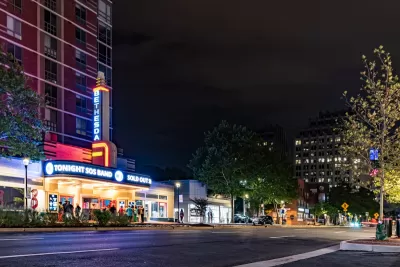The county hasn’t acted on the recommendations of its own Nighttime Economy Task Force, which suggested ways to improve the business climate for restaurants and nightclubs to draw younger residents to the region.

In a piece for Greater Greater Washington, Weston Henry describes how Montgomery County’s business regulations are stifling the development of nightlife in the county.
According to Henry, the Nighttime Economy Task Force, formed in 2013, published a series of recommendations to revitalize the county and bring more residents and businesses to the area. “And yet, here we are eleven years later, with no dance clubs, few late-night spots, and little evidence to suggest that the perception of the county as a social desert for singles has changed.”
Henry blames this on the Board of License Commissioners, which “is solely responsible for creating the county’s alcohol rules and regulations, and have created a series of regulations seemingly designed with the sole intention of preventing any venue catering to young, single, or recently transplanted people to open in the county.” Henry notes that restrictions on restaurants and bars such as requiring that 40 percent of income be earned through food sales, prohibiting dancing in venues without a special license, and requiring a full menu of food are preventing businesses from operating successfully. While the task force recommended a new social venue license, it was never created.
While some local officials say the younger work force will move back to the county after they have kids, this belief, Henry writes, “is a terrible economic strategy. It contributes to our massive labor shortage, which forces employers to eliminate positions, as the county itself did last year, or move to where they can find people to fill these positions.”
FULL STORY: Where’s the nightlife in Montgomery County?

Planetizen Federal Action Tracker
A weekly monitor of how Trump’s orders and actions are impacting planners and planning in America.

Maui's Vacation Rental Debate Turns Ugly
Verbal attacks, misinformation campaigns and fistfights plague a high-stakes debate to convert thousands of vacation rentals into long-term housing.

Restaurant Patios Were a Pandemic Win — Why Were They so Hard to Keep?
Social distancing requirements and changes in travel patterns prompted cities to pilot new uses for street and sidewalk space. Then it got complicated.

Charlottesville Temporarily Has No Zoning Code
A judge ordered the Virginia city to throw out its newly revised zoning code, leaving permitting for new development in legal limbo.

In California Battle of Housing vs. Environment, Housing Just Won
A new state law significantly limits the power of CEQA, an environmental review law that served as a powerful tool for blocking new development.

Boulder Eliminates Parking Minimums Citywide
Officials estimate the cost of building a single underground parking space at up to $100,000.
Urban Design for Planners 1: Software Tools
This six-course series explores essential urban design concepts using open source software and equips planners with the tools they need to participate fully in the urban design process.
Planning for Universal Design
Learn the tools for implementing Universal Design in planning regulations.
Heyer Gruel & Associates PA
JM Goldson LLC
Custer County Colorado
City of Camden Redevelopment Agency
City of Astoria
Transportation Research & Education Center (TREC) at Portland State University
Jefferson Parish Government
Camden Redevelopment Agency
City of Claremont




























